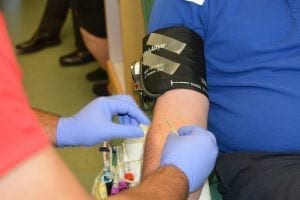According to a story from BioSpace, the genomic medicine company Sangamo Therapeutics, Inc. and Pfizer, Inc. recently announced the release of interim data from a Phase I/II clinical trial. This clinical trial is testing SB-525, an investigational gene therapy that is being developed as a treatment for hemophilia A. These interim findings suggest that this experimental drug is well tolerated and patients have displayed increased factor VIII activity in correspondence with the dose that they received.
About Hemophilia
Hemophilia is a genetic disorder which affects the ability of the blood to form clots, a process that is vital for stopping bleeding after a wound is sustained. The severity of symptoms can vary widely. The disorder is caused by a mutation found on the X chromosome. Symptoms include bleeding for a long time after an injury, risk of bleeding in the brain and joints, and easy bruising. Bleeding in the joints can cause permanent damage and brain bleeding can lead to headaches, decreased consciousness, and seizures. There are multiple types of hemophilia, with the most common types being type A and type B, which are distinguished by having deficiencies in different clotting factors. Treatment involves replacing the missing clotting factor. Drugs that thin the blood should be avoided. To learn more about hemophilia, click here.
About The Interim Data
Hemophilia A is the form of hemophilia which is linked to insufficient activity from clotting factor VIII. The interim data includes information from eight patients that were dosed with SB-525. These patients were divided into four dosing level cohorts of two patients each. The findings are encouraging as each patient saw corresponding increases in factor VIII activity depending on the dose. The cohort with the highest dosing level of 3e13 vg/kg saw their activities levels normalize into the range of activity that is found in people unaffected by hemophilia A. Patients were also able to reduce or halt their use of factor replacement therapy.
There was generally low variability in how patients responded to treatment with SB-525, which is another desirable characteristic. Overall, the interim data suggests that this gene therapy could have the potential to dramatically improve the lives of patients with hemophilia A. Hopefully continued study in the trial will reinforce these early findings.








